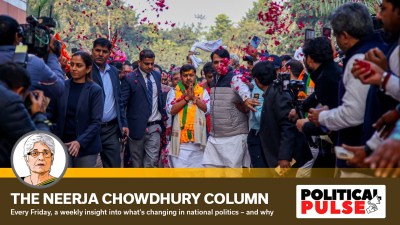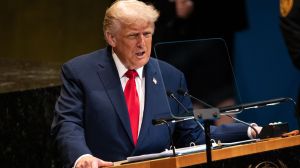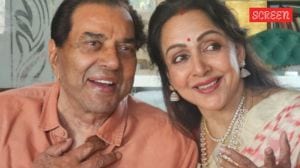THE BJP Wednesday attacked former vice-president Hamid Ansari over media reports quoting a “Pakistani journalist”, Nusrat Mirza, as saying Ansari had invited him to India and that he had shared the information he collected during these visits with Pakistan’s ISI.
The BJP demanded answers from both Ansari and the Congress, saying they should share the details of these visits, reportedly between 2005 and 2011.

It is not the first time Ansari finds himself in the BJP’s cross-hairs, or the first time it has raised his alleged Pakistani links — with the Modi government and the former vice-president sharing an uneasy relationship even when the former was in office.
In his reaction to the BJP’s charges, Ansari called them a “litany of falsehood”, adding: “I am bound by the commitment to national security in such matters and refrain from commenting on them. The Government of India has all the information and is the only authority to tell the truth.”
Ansari, who was a career diplomat, was picked for the Vice-President’s post by the UPA and is only the second person after Sarvepalli Radhakrishnan to have held the second highest constitutional post in India for two, successive, full terms. Three years of his second tenure, which ended in 2017, were under the Modi government.
Addressing a virtual panel discussion organised by the Indian American Muslim Council earlier this year, along with four US lawmakers, Ansari had said: “In recent years, we have experienced the emergence of trends and practices that dispute the well-established principle of civic nationalism and interpose a new and imaginary practice of cultural nationalism… It seeks to present an electoral majority in the guise of a religious majority… It wants to distinguish citizens on the basis of their faith.”
The Ministry of External Affairs had reacted promptly, saying the track record of the event organisers was as well-known as “the biases and political interests of the participants”. “The claim that others need to protect our Constitution is presumptuous and preposterous.”
Story continues below this ad
In his autobiography By Many a Happy Accident, released after his retirement, Ansari wrote about how disagreements between him and the Modi government began soon after it came to power. He says that a demand was raised “by the government floor managers that a Bill may be allowed to be passed (despite) din in the Rajya Sabha”. “It was pointed out… that while there were instances in the past when Bills were indeed passed in the din, that happened with a necessary precondition that the government had a majority in the House… However, in the current case, the ruling NDA did not have a majority (in the Rajya Sabha),” Ansari wrote.
He added that while he had taken the same position when the UPA was in power, the Manmohan Singh government had taken cognizance of his “principled stand”. “The NDA, on the other hand, felt that its majority in the Lok Sabha gave it the ‘moral’ right to prevail over procedural impediments in the Rajya Sabha.”
In the last few years, the Opposition has often accused the government of rushing through Bills in the Rajya Sabha and passing legislation in the din.
Ansari also wrote in the book about Modi dropping in at his Rajya Sabha office and telling him, “there are expectations of higher responsibilities (for) you but you are not helping me”. He said Modi also complained about Rajya Sabha TV coverage, and that he pointed out that he had no editorial control over it.
Story continues below this ad
Things had taken an ugly turn when, in December 2017, campaigning for the Gujarat Assembly elections, Modi accused Pakistan of interfering in the polls and talked about former PM Manmohan Singh and Ansari being part of a “secret meeting” at Congress leader Mani Shankar Aiyar’s residence in which some Pakistani officials were present.
Following an uproar in Parliament, the government had clarified in the Rajya Sabha: “Let me categorically state that the Prime Minister did not question nor did he mean to question the commitment to this nation of either Dr Manmohan Singh or Hamid Ansari.”
Ansari’s consistent remarks on secularism and insecurity among minorities have also drawn a reaction from the government. Just before his retirement, speaking at the annual convocation of the National Law School of India University in Bengaluru, Ansari had expressed concern over “enhanced apprehensions of insecurity amongst segments of our citizen body, particularly Dalits, Muslims and Christians”.
At a farewell speech for Ansari in the Rajya Sabha soon after, Modi, apparently striking back, had said: “You were associated with West Asia for a major part of your career as a diplomat. You spent many years of your life in that circle… in that thought… For a major part after your retirement, whether it was in the Minority Commission or Aligarh Muslim University, you remained in that circle. But for 10 years, you had a different responsibility. Every moment, you had to remain confined to the Constitution and you tried your best to fulfil that responsibility… It is possible that there was some restlessness within you as well, but from today you will not face that crisis… You now have the joy of being liberated, and the opportunity to work, think and speak according to your core beliefs.”
Story continues below this ad
In a reaction to Ansari’s remarks early this year, the BJP’s Shahnawaz Hussain had hinted at the old rancour. Hussain said Ansari should not have agreed to join the online event organised by the Indian American Muslim Council “which is known for anti-India propaganda”. “Even as Vice-President, Ansari had stirred controversies for which people of the country have not forgiven him,” he had said.
At the press conference on Wednesday, the BJP said journalist Nusrat Mirza had visited India as many as five times and was allowed to travel to seven cities instead of the usual four for a foreign visitor. “India has been leading the campaign against terrorism and the Congress government invited a person who was given information that was used against our country and its people,” the BJP said.
The party asked both the Congress, which was in power during the said period, and Ansari to tell the country about these visits, adding that Ansari should clarify if he had been cautioned by intelligence agencies that the journalist was sharing his information with the ISI. The party also demanded to know whether Ansari had “taken instructions from the Gandhis to invite the journalist”.
Incidentally, the BJP’s allegations come amidst the Congress launching a coordinated media campaign against the BJP over two people recently held for attacks on Hindus having links to the party, questioning its anti-terror credentials.
Story continues below this ad
Dismissing the BJP’s claims Wednesday, the Congress said its “insinuations and innuendos” are “character assassination of the worst form”.

































